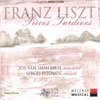Liszt Pièces Tardives
Can late Liszt on early instruments really illuminate those desolate years?
View record and artist detailsRecord and Artist Details
Composer or Director: Franz Liszt
Genre:
Instrumental
Label: Zig-Zag Territoires
Magazine Review Date: 11/2005
Media Format: CD or Download
Media Runtime: 67
Mastering:
Stereo
DDD
Catalogue Number: ZZT040902

Tracks:
| Composition | Artist Credit |
|---|---|
| Wiegenlied, 'Chant du berceuse' |
Franz Liszt, Composer
Franz Liszt, Composer Jos van Immerseel, Piano |
| Schlummerlied im Grabe |
Franz Liszt, Composer
Franz Liszt, Composer Jos van Immerseel, Piano Sergei Istomin, Cello |
| Funeral Odes, Movement: La notte, S699 (1864-66: from S112/2) |
Franz Liszt, Composer
Franz Liszt, Composer Jos van Immerseel, Piano |
| Elegie No. 2 |
Franz Liszt, Composer
Franz Liszt, Composer Jos van Immerseel, Piano Sergei Istomin, Cello |
| Nuages gris |
Franz Liszt, Composer
Franz Liszt, Composer Jos van Immerseel, Piano |
| Romance oubliée |
Franz Liszt, Composer
Franz Liszt, Composer Jos van Immerseel, Piano Sergei Istomin, Cello |
| Am Grabe Richard Wagners |
Franz Liszt, Composer
Franz Liszt, Composer Jos van Immerseel, Piano |
| (Die) Zelle in Nonnenwerth |
Franz Liszt, Composer
Franz Liszt, Composer Jos van Immerseel, Piano Sergei Istomin, Cello |
| (2) Csárdás, Movement: Csárdás obstiné |
Franz Liszt, Composer
Franz Liszt, Composer Jos van Immerseel, Piano |
| Abschied |
Franz Liszt, Composer
Franz Liszt, Composer Jos van Immerseel, Piano |
| (La) lugubre gondola |
Franz Liszt, Composer
Franz Liszt, Composer Jos van Immerseel, Piano Sergei Istomin, Cello |
| Unstern: sinistre, disastro |
Franz Liszt, Composer
Franz Liszt, Composer Jos van Immerseel, Piano |
Author: Bryce Morrison
This disc of late pieces provides a dour and destabilising experience. Here, Liszt’s ‘exuberance of heart’ gives way to ‘bitterness of heart’ with a vengeance, a voice crying in the wilderness. Certainly Liszt’s moments of religious solace lessened as he reflected wryly on his years as the world’s most charismatic virtuoso, his unrequited generosity and a sense of having lived too long, of having outstayed his welcome. By his own confession he felt ‘a deep sorrow in my heart’, reflected in what has aptly been called a ‘soundscape of despair’.
Yet if Liszt saw his life as ‘a long dissonance without a final resolution’, the dark-hued romanticism of his final years resonates with remarkable prophecy as well as pain. Virtually all the works on this disc originally intended for the piano have been re-thought, emerging as though from a chrysalis – sometimes for cello and piano or in extended elaborations (La notte, for example). Nuages gris remains as we have always known it, a statement as bleak and disconsolate as Liszt’s former glory was extravagant and theatrical. But the Csárdás obstiné has sudden swirls of sound added to its insistent rhythm and throughout you are aware of both Sergei Istomin’s and Jos van Immerseel’s scholarly endeavour.
However, the claim that such revolutionary music sounds best on period instruments, accentuating the contrast of old and new, seems dubious. And if the silvery sound of Immerseel’s 1886 and 1897 Erard pianos emphasises the music’s spare and enigmatic nature, one only has to listen to, say, Brendel playing Csárdás obstiné (Vanguard Classics, 2/92) or Sergio Fiorentino playing the Second Elegy (APR) to hear performances of a different calibre on modern instruments which surely expand rather than limit one’s sense of Liszt’s vision.
These worthy rather than illuminating performances have been well recorded and are accompanied by an excellent essay by Cécile Reynaud and by a lengthy defence for the use of early instruments by Jos van Immerseel.
Yet if Liszt saw his life as ‘a long dissonance without a final resolution’, the dark-hued romanticism of his final years resonates with remarkable prophecy as well as pain. Virtually all the works on this disc originally intended for the piano have been re-thought, emerging as though from a chrysalis – sometimes for cello and piano or in extended elaborations (La notte, for example). Nuages gris remains as we have always known it, a statement as bleak and disconsolate as Liszt’s former glory was extravagant and theatrical. But the Csárdás obstiné has sudden swirls of sound added to its insistent rhythm and throughout you are aware of both Sergei Istomin’s and Jos van Immerseel’s scholarly endeavour.
However, the claim that such revolutionary music sounds best on period instruments, accentuating the contrast of old and new, seems dubious. And if the silvery sound of Immerseel’s 1886 and 1897 Erard pianos emphasises the music’s spare and enigmatic nature, one only has to listen to, say, Brendel playing Csárdás obstiné (Vanguard Classics, 2/92) or Sergio Fiorentino playing the Second Elegy (APR) to hear performances of a different calibre on modern instruments which surely expand rather than limit one’s sense of Liszt’s vision.
These worthy rather than illuminating performances have been well recorded and are accompanied by an excellent essay by Cécile Reynaud and by a lengthy defence for the use of early instruments by Jos van Immerseel.
Discover the world's largest classical music catalogue with Presto Music.

Gramophone Digital Club
- Digital Edition
- Digital Archive
- Reviews Database
- Full website access
From £8.75 / month
Subscribe
Gramophone Full Club
- Print Edition
- Digital Edition
- Digital Archive
- Reviews Database
- Full website access
From £11.00 / month
Subscribe
If you are a library, university or other organisation that would be interested in an institutional subscription to Gramophone please click here for further information.




